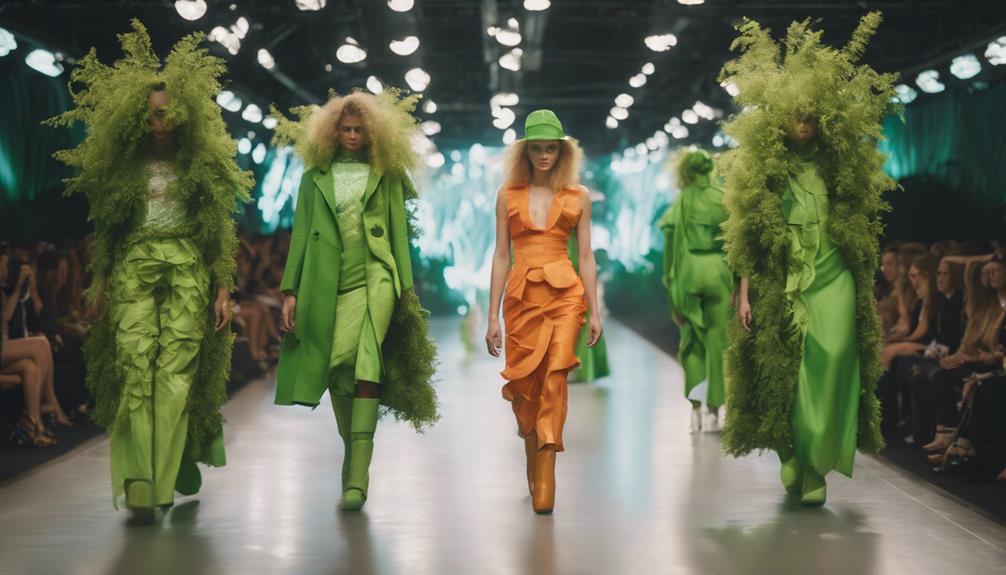Sustainable Fashion Week is a thrilling event that shines a spotlight on the fashion industry’s transition to eco-friendly practices and innovations. Witness designers unveiling collections crafted from sustainable materials and discover waste reduction strategies. Cities such as Copenhagen and Helsinki are at the forefront with stringent sustainability standards for brands taking part. This impactful event not only advocates for transparency in the supply chain but also involves consumers in important discussions about their environmental impact. Prepare to be inspired by the creative strategies brands are adopting to prioritize sustainability and the way this event is influencing the future of fashion. Want to learn more?
Key Takeaways
- Sustainable Fashion Week showcases eco-friendly practices and innovations within the fashion industry, emphasizing environmental responsibility.
- Major fashion weeks, like Copenhagen and Helsinki, are implementing strict sustainability guidelines and requirements for participating brands.
- The event addresses significant environmental challenges, including carbon emissions and waste generation associated with traditional fashion shows.
- Innovative practices, such as digital invitations and the use of recycled materials, are being adopted to reduce waste and promote sustainability.
Overview of Sustainable Fashion Week
Sustainable Fashion Week showcases eco-friendly practices and innovations in the fashion industry, driving a collective effort to reduce environmental impact. This event highlights the importance of sustainability requirements that fashion brands must meet to be part of the movement. The event also features discussions and workshops on sustainable and ethical production, materials, and consumption. By promoting the use of organic and recycled materials, as well as fair labor practices, Sustainable Fashion Week educates consumers on the benefits of making more conscious fashion choices. This event underscores why sustainable fashion matters, as it encourages industry stakeholders and consumers to prioritize environmentally friendly practices and make informed decisions about their clothing purchases.
For instance, Copenhagen Fashion Week has set a benchmark by mandating that at least 50% of collections use new generation materials, ensuring a commitment to ethical production methods.
Helsinki Fashion Week stands out as the pioneer in sustainable fashion initiatives, partnering with eco-friendly production companies and emphasizing renewable energy and resource efficiency.
As more cities recognize the need for sustainable practices, Berlin Fashion Week plans to implement mandatory sustainability criteria by February 2026, adapting successful guidelines from Copenhagen. This shift reflects a growing global trend where cities like Oslo and Helsinki adopt frameworks that prioritize sustainability within the fashion industry.
Environmental Challenges in Fashion

When you look at the fashion industry, the carbon footprint is staggering, with events like Fashion Month releasing tons of CO2 into the atmosphere.
You might also notice how waste generation from shows adds to the problem, with discarded materials piling up after each event.
It's clear that both carbon emissions and waste need urgent attention if we want to move towards sustainable practices.
Carbon Footprint Concerns
The fashion industry's carbon footprint is staggering, with Fashion Month alone generating around 241,000 tons of CO2, highlighting the urgent need for change. You might be surprised to learn that New York Fashion Week accounts for 37% of these emissions. This alarming statistic emphasizes the pressing necessity for sustainability within the industry.
Traditional fashion shows contribute greatly to carbon emissions, not just through global travel but also due to high energy consumption for lighting and production. The materials used in sets and props often end up discarded, further compounding the environmental impact. Fashion brands face a critical challenge; many resist change or fall prey to greenwashing, which complicates genuine sustainability efforts.
It's essential for you, as a conscious consumer, to demand more from the brands you support. Advocacy for transparency and accountability can drive positive transformation in the industry. By understanding the carbon footprint associated with fashion, you can make informed choices that promote sustainability.
Let's work together to encourage fashion brands to prioritize eco-friendly practices and reduce their carbon emissions. Change is possible, and it starts with you.
Waste Generation Issues
Fashion shows create enormous amounts of waste, with discarded sets, props, and unsold collections piling up and posing serious environmental challenges. The fashion industry's waste generation is staggering, especially during events like Fashion Month, where about 241,000 tons of CO2 are emitted. New York Fashion Week alone is responsible for 37% of these emissions, highlighting the event's role in exacerbating waste issues.
High energy consumption during these shows, driven by lighting and production, further contributes to waste generation. You might wonder why this continues, and the answer lies in the industry's reluctance to embrace sustainable practices. Many established norms prioritize short-lived aesthetics over long-term sustainability, making it tough to shift toward eco-friendly solutions.
To combat these challenges, it's essential for you and others in the industry to advocate for waste reduction strategies. By supporting sustainable practices, like recycling materials and opting for eco-friendly designs, you can help transform the fashion landscape. It's time to rethink how we engage with fashion shows, ensuring they contribute to a healthier planet rather than adding to the problem.
Key Models of Sustainability

When you think about sustainability in fashion, consider the innovative eco-friendly practices emerging across the industry.
Many fashion weeks now set sustainable material requirements, pushing brands to rethink their production methods.
Additionally, global collaborative initiatives are gaining traction, uniting designers and organizations in the pursuit of a more responsible fashion future.
Innovative Eco-Friendly Practices
Innovative eco-friendly practices in the fashion industry are reshaping how brands approach sustainability, pushing them to embrace materials and methods that greatly reduce environmental impact.
Events like Helsinki and Copenhagen Fashion Weeks are leading the charge by partnering with eco-friendly production companies and implementing strict sustainability requirements for participating brands. For instance, Copenhagen requires that at least 50% of collections utilize new generation materials, such as recycled and upcycled textiles.
Moreover, these fashion weeks are adopting innovative solutions to minimize waste, like replacing traditional paper invitations with digital QR codes. This commitment to sustainability is evident in emerging brands, such as (di)visions, which focus on using deadstock and upcycled materials, and Stine Goya, which explores sustainable sequins.
As other fashion weeks in Oslo and Helsinki begin to adopt similar sustainability frameworks, you're witnessing a growing trend toward eco-friendly practices across the industry.
Sustainable Material Requirements
Sustainable material requirements are setting new standards in the fashion industry, pushing brands to prioritize eco-friendly alternatives in their collections. Events like Copenhagen Fashion Week mandate that participating brands use at least 50% new generation materials, which encourages the shift towards sustainable material usage. This initiative highlights the importance of textiles that serve as alternatives to animal-derived materials, such as deadstock, recycled, and upcycled fabrics.
By implementing these criteria, Copenhagen Fashion Week fosters an environment where brands like (di)visions and Stine Goya lead the charge in innovative practices, utilizing deadstock and recycled materials in their designs. This not only reduces waste but also aligns with the growing consumer demand for sustainable fashion.
Furthermore, other fashion weeks, including Helsinki and Berlin, follow suit by establishing their own sustainability requirements. They guarantee brands adhere to responsible material sourcing and production practices.
Global Collaborative Initiatives
Global collaborative initiatives among fashion weeks are reshaping the industry by establishing key models of sustainability that encourage shared responsibility and collective action.
For instance, Helsinki Fashion Week has set the standard as the first sustainable fashion week, partnering with eco-friendly production companies to reduce environmental impact. Similarly, Copenhagen Fashion Week has introduced 18 sustainability requirements for participating brands, ensuring that at least 50% of collections incorporate new generation materials while rigorously addressing supply chain ethics.
This collaborative spirit is spreading, with Oslo and Helsinki adopting Copenhagen's sustainability framework, demonstrating a united front in promoting eco-conscious practices. Berlin Fashion Week plans to implement mandatory sustainability criteria by February 2026, further adapting Copenhagen's guidelines to reflect its values of freedom, inclusion, and creativity.
These collaborative initiatives are pivotal for fostering industry-wide change. Brands are responding positively, showing strong support for these new sustainability directions.
Notable Global Events

Fashion weeks around the world are increasingly embracing sustainability, showcasing a commitment to eco-friendly practices and ethical standards.
This shift isn't just a trend; it's a movement redefining the fashion landscape. Here are some notable global events leading the charge:
- Copenhagen Fashion Week: With 18 sustainability requirements for 2023, it mandates that 50% of collections use new generation materials, ensuring ethical supply chain practices.
- Helsinki Fashion Week: Recognized as the first sustainable fashion week, it focuses on eco-friendly partnerships to minimize environmental impact and promote sustainable practices.
- Berlin Fashion Week: Set to introduce mandatory sustainability criteria by February 2026, it collaborates with Copenhagen Fashion Week to enhance responsible practices.
- Oslo Runway: This event has adopted similar sustainability standards, reflecting a global trend towards integrating eco-consciousness into fashion weeks.
As you explore these fashion events, you'll see how sustainability isn't just an afterthought—it's becoming central to the industry's future.
From innovative materials to ethical practices, these events are paving the way for a more responsible fashion world.
Industry Reactions and Progress

Designers are steering through a complex landscape of sustainability measures, with reactions ranging from enthusiastic support to cautious skepticism. While some, like Henrik Vibskov, embrace these efforts, others, like Charlotte Eskildsen, prefer the term 'responsible' over 'sustainable'. Despite the initial doubts, the fashion sector has shown significant progress in recent years, especially with compliance to the 18 sustainability requirements from Copenhagen Fashion Week.
Independent brands often feel the strain against fast-fashion giants, raising concerns about double standards in sustainability practices. The increasing influence of Copenhagen's sustainability framework has inspired cities like Oslo and Helsinki to adopt similar measures. Emerging talent in the industry is vital for pushing the boundaries of sustainability further.
Here's a look at the varied reactions within the industry:
| Designer | Reaction | Focus Area |
|---|---|---|
| Henrik Vibskov | Enthusiastic support | Sustainable practices |
| Charlotte Eskildsen | Cautious skepticism | Responsible fashion |
| Independent Brands | Concern over double standards | Fair competition |
Ongoing dialogue and collaboration among brands are essential for driving meaningful change and enhancing sustainability efforts in the fashion industry.
Future Innovations in Fashion

Innovative approaches are set to reshape the landscape of sustainable fashion, focusing on eco-friendly practices and advanced technologies that promise to redefine industry standards. As you look towards the future of fashion, you'll notice several key trends emerging:
- Mandatory Sustainability Criteria: By 2026, events like Berlin Fashion Week will implement strict sustainability guidelines, echoing Copenhagen's eco-friendly framework.
- Material Reuse: Brands like (di)visions and Ganni are pioneering the use of deadstock and recycled materials, highlighting the necessity of reusing materials in their collections.
- Sustainable Tech Awards: The introduction of new categories, such as Sustainable Tech Innovator at the Planet Fashion TV Sustainability Awards, emphasizes the recognition of technological advancements in sustainable fashion.
- Waste Reduction Solutions: Digital QR codes for invitations at Copenhagen Fashion Week showcase innovative methods aimed at minimizing waste during fashion shows.
These innovations aren't just trends; they represent a significant shift towards sustainability in the fashion industry, promoting transparency and traceability across supply chains.
As you engage with the future of fashion, keep an eye on these developments that are set to transform the industry for good.
Importance of Consumer Engagement

As the fashion industry embraces sustainability, engaging consumers becomes vital for driving meaningful change and promoting eco-friendly practices.
Studies show that 66% of global consumers are willing to pay more for sustainable brands, underscoring a strong market demand for these initiatives. Events like Sustainable Fashion Week play an important role in this by educating you about the environmental impact of your purchasing decisions. This fosters a culture of mindful consumption within the fashion industry.
When you participate in recycling initiatives and take-back programs, you can markedly reduce waste—some programs have achieved waste reductions of up to 60%. Additionally, engaging in sustainability initiatives increases the likelihood that you'll advocate for eco-friendly practices in your community, creating a ripple effect that influences others.
Interactive platforms at Sustainable Fashion Week allow you to connect with brands, learn about sustainable practices, and understand the importance of transparency in the fashion supply chain. This engagement not only enhances your commitment to sustainability but also empowers you to make informed choices that support eco-friendly practices, ensuring that your fashion footprint leaves a positive impact.
Frequently Asked Questions
What Is Meant by Sustainable Fashion?
Sustainable fashion means you're choosing eco-friendly materials, ethical production methods, and responsible consumption. It's about reducing waste, minimizing environmental impact, and supporting practices that promote a healthier planet for future generations.
What Is the Problem With Sustainable Fashion?
Did you know the fashion industry accounts for about 8% of global greenhouse gas emissions? The problem with sustainable fashion lies in greenwashing, resistance to change, and outdated practices that hinder real environmental progress.
What Do People Think About Sustainable Fashion?
You'll find opinions on sustainable fashion vary widely. Some appreciate its eco-friendly approach, while others criticize it for lacking thorough labor protections. Overall, consumers increasingly demand transparency, pushing brands to embrace more responsible practices.
What Is the Sustainable Fashion Week Show?
Sustainable Fashion Week showcases innovative designers who prioritize eco-friendly practices. You'll see collections made from recycled materials, learn about supply chain transparency, and discover how fashion can positively impact the environment while promoting ethical practices.
Conclusion
Sustainable Fashion Week shines a spotlight on the urgent need for change in the fashion industry. Did you know that the fashion sector is responsible for about 10% of global carbon emissions?
By participating in events like this, you're not just witnessing innovation; you're also joining a movement towards a greener future. Engaging with sustainable practices helps reduce waste and promotes ethical consumption.
Together, we can redefine fashion and make a positive impact on our planet.









